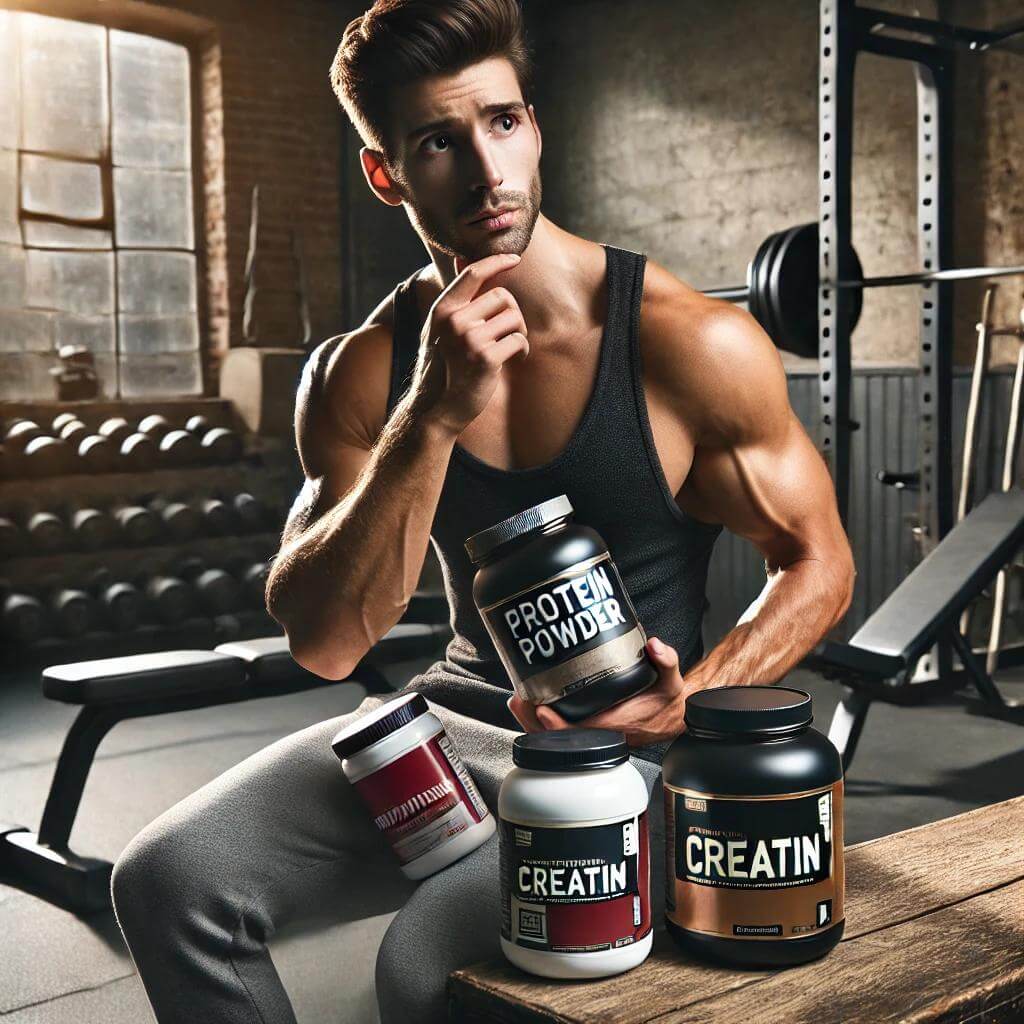Maintain Muscle While Losing Weight: Essential Nutrition Tips
Balancing nutrition and exercise is crucial for achieving weight loss without compromising muscle mass. This goal requires a strategic approach to diet and supplementation, especially for those with busy schedules. In this guide, we’ll delve deeper into how to eat for weight loss while preserving muscle, focusing on key nutritional principles, meal examples, and the role of supplements.
Combining Proper Nutrition for Weight Loss While Maintaining Muscle Mass
Achieving weight loss while preserving muscle mass is a delicate balancing act. For those who exercise regularly, it’s essential to create a calorie deficit to lose fat, but doing so without compromising muscle requires careful dietary planning. This section will explore how to combine proper nutrition with exercise to achieve your goals.
Key Concepts:
- Calorie Deficit: Essential for fat loss, but must be moderate to avoid muscle loss.
- Protein Intake: Critical for muscle preservation and recovery.
- Carbohydrates: Necessary to fuel workouts and maintain energy levels.
Principles of Nutrition for Cutting
Calorie Deficit: The Foundation of Weight Loss
A calorie deficit is the cornerstone of any weight loss program. However, the size of the deficit plays a crucial role in determining whether you lose fat, muscle, or both. A small, controlled deficit ensures that you’re primarily losing fat while maintaining muscle mass.
Key Points:
- Moderate Deficit: A deficit of 300-500 calories per day is recommended for gradual weight loss, helping to preserve muscle mass.
- Tracking: Using apps like MyFitnessPal or Cronometer can help monitor your calorie intake and ensure you’re not exceeding your deficit.
Table 1: Example Calorie Deficit Calculation
| Current Weight (kg) | Maintenance Calories | Target Deficit (20%) | Daily Calorie Goal |
|---|---|---|---|
| 70 kg | 2500 kcal/day | 500 kcal/day | 2000 kcal/day |
| 80 kg | 2800 kcal/day | 560 kcal/day | 2240 kcal/day |
| 90 kg | 3100 kcal/day | 620 kcal/day | 2480 kcal/day |
Protein: The Key to Preserving Muscle
Protein plays a vital role in muscle maintenance during weight loss. It provides the necessary amino acids for muscle repair and helps prevent muscle breakdown during a calorie deficit.
Recommended Protein Intake:
- Daily Requirement: 1.6 to 2.2 grams of protein per kilogram of body weight. For example, a 70kg individual should consume between 112 and 154 grams of protein daily.
- Protein Timing: Distribute your protein intake evenly across meals to optimize muscle protein synthesis.
- Animal-Based: Chicken, turkey, fish, eggs, and dairy products.
- Plant-Based: Tofu, tempeh, legumes, quinoa, and seitan.
Table 2: Protein Content in Common Foods
| Food Item | Serving Size | Protein (g) |
|---|---|---|
| Chicken Breast | 100g | 31g |
| Tofu | 100g | 8g |
| Greek Yogurt | 100g | 10g |
| Quinoa | 100g | 4g |
| Eggs | 1 large | 6g |
Carbohydrates: Fuel for Your Workouts
Carbohydrates are crucial for providing energy, particularly during high-intensity workouts. While some people reduce carbs to create a calorie deficit, it’s important to manage carb intake carefully to maintain workout performance and recovery.
Carbohydrate Management:
- Timing: Consume carbs around your workouts—before for energy and after for recovery.
- Complex Carbs: Choose sources like whole grains, vegetables, and legumes, which provide sustained energy and are rich in fiber.
Infographic: Optimal Carbohydrate Timing for Workouts
- Pre-Workout: Consume carbs 1-2 hours before exercise for energy.
- Post-Workout: Have carbs within 30 minutes post-exercise to replenish glycogen stores.
Examples of Meals for Weight Loss and Muscle Preservation
Planning meals that support weight loss while preserving muscle is crucial. Below are meal examples that balance protein, carbohydrates, and fats to meet your goals.
Breakfast Ideas
- Greek Yogurt with Berries and Nuts:
- Greek yogurt: 1 cup
- Mixed berries: ½ cup
- Almonds or walnuts: 1 tablespoon
- Nutritional Info: 250 kcal, 20g protein, 20g carbs, 10g fat
- Omelette with Spinach and Feta:
- Eggs or egg whites: 3
- Fresh spinach: 1 cup
- Feta cheese: ¼ cup
- Whole-grain toast: 1 slice
- Nutritional Info: 300 kcal, 25g protein, 15g carbs, 15g fat
Lunch Ideas
- Grilled Chicken Salad:
- Quinoa and Black Bean Bowl:
- Cooked quinoa: 1 cup
- Black beans: ½ cup
- Corn, diced tomatoes, onions: ¼ cup each
- Nutritional Info: 350 kcal, 15g protein, 55g carbs, 10g fat
Dinner Ideas
- Baked Salmon with Steamed Vegetables:
- Salmon fillet: 150g
- Steamed broccoli, carrots, green beans: 1 cup each
- Quinoa or brown rice: ½ cup
- Nutritional Info: 500 kcal, 35g protein, 30g carbs, 25g fat
- Stir-Fry with Tofu and Vegetables:
- Firm tofu, cubed: 200g
- Mixed bell peppers, broccoli, snap peas: 1 cup each
- Soy sauce and ginger seasoning
- Brown rice: ½ cup
- Nutritional Info: 450 kcal, 20g protein, 50g carbs, 15g fat
Snack Ideas
- Cottage Cheese with Pineapple:
- Cottage cheese: 1 cup
- Diced pineapple: ½ cup
- Nutritional Info: 150 kcal, 15g protein, 20g carbs, 3g fat
- Protein Shake:
- Protein powder: 1 scoop
- Almond milk: 1 cup
- Peanut butter: 1 tablespoon
- Ice cubes, blended
- Nutritional Info: 300 kcal, 25g protein, 10g carbs, 15g fat
Incorporating Supplements and Shakes During Cutting
Protein Supplements
Protein supplements like whey or plant-based protein powders are convenient for ensuring you meet your daily protein requirements, especially when time is limited.
Uses:
- Post-Workout Recovery: Consume a protein shake within 30 minutes after a workout to aid in muscle recovery.
- Meal Replacement: On particularly busy days, a protein shake with added fruits and healthy fats can substitute a meal.
Recommended Brands:
- Whey Protein: Optimum Nutrition, Dymatize
- Plant-Based Protein: Vega, Garden of Life
BCAAs (Branched-Chain Amino Acids)
BCAAs are beneficial for preserving muscle during workouts, especially when training on an empty stomach or in a calorie deficit.
Benefits:
- Muscle Preservation: BCAAs provide essential amino acids that reduce muscle breakdown.
- Reduced Fatigue: Helps delay fatigue during prolonged exercise.
Creatine
Creatine is one of the most researched supplements for strength and muscle preservation. It increases muscle endurance and strength, making it easier to maintain intensity during workouts.
Dosage:
- Standard Dosage: 3-5 grams per day, ideally taken post-workout.
HR Divider
Conclusion: Planning an Effective Cutting Diet Without Compromising Muscle Mass
To achieve weight loss while preserving muscle mass, it’s essential to maintain a moderate calorie deficit, prioritize high protein intake, and strategically manage your carbohydrate intake. Incorporating supplements like protein powders, BCAAs, and creatine can further support your goals. With careful meal planning and the right supplementation, you can achieve a leaner physique while retaining muscle mass.
*Disclaimer: The information provided in this article is for educational and informational purposes only and should not be construed as health advice. The content is solely the personal opinion of the author and is not intended to be a substitute for professional medical advice, diagnosis, or treatment. Always seek the advice of your physician or other qualified health provider with any questions you may have regarding a medical condition or before starting any new diet or treatment. Read more




Post Comment